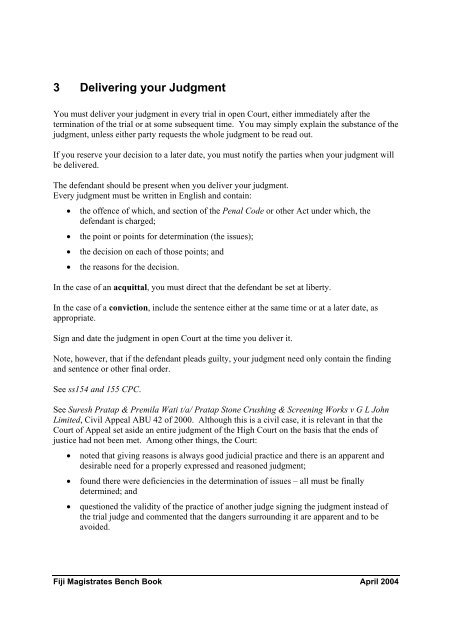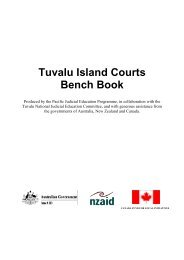Fiji Magistrates Bench Book - Federal Court of Australia
Fiji Magistrates Bench Book - Federal Court of Australia
Fiji Magistrates Bench Book - Federal Court of Australia
Create successful ePaper yourself
Turn your PDF publications into a flip-book with our unique Google optimized e-Paper software.
3 Delivering your Judgment<br />
You must deliver your judgment in every trial in open <strong>Court</strong>, either immediately after the<br />
termination <strong>of</strong> the trial or at some subsequent time. You may simply explain the substance <strong>of</strong> the<br />
judgment, unless either party requests the whole judgment to be read out.<br />
If you reserve your decision to a later date, you must notify the parties when your judgment will<br />
be delivered.<br />
The defendant should be present when you deliver your judgment.<br />
Every judgment must be written in English and contain:<br />
• the <strong>of</strong>fence <strong>of</strong> which, and section <strong>of</strong> the Penal Code or other Act under which, the<br />
defendant is charged;<br />
• the point or points for determination (the issues);<br />
• the decision on each <strong>of</strong> those points; and<br />
• the reasons for the dec ision.<br />
In the case <strong>of</strong> an acquittal, you must direct that the defendant be set at liberty.<br />
In the case <strong>of</strong> a conviction, include the sentence either at the same time or at a later date, as<br />
appropriate.<br />
Sign and date the judgment in open <strong>Court</strong> at the time you deliver it.<br />
Note, however, that if the defendant pleads guilty, your judgment need only contain the finding<br />
and sentence or other final order.<br />
See ss154 and 155 CPC.<br />
See Suresh Pratap & Premila Wati t/a/ Pratap Stone Crushing & Screening Works v G L John<br />
Limited, Civil Appeal ABU 42 <strong>of</strong> 2000. Although this is a civil case, it is relevant in that the<br />
<strong>Court</strong> <strong>of</strong> Appeal set aside an entire judgment <strong>of</strong> the High <strong>Court</strong> on the basis that the ends <strong>of</strong><br />
justice had not been met. Among other things, the <strong>Court</strong>:<br />
• noted that giving reasons is always good judicial practice and there is an apparent and<br />
desirable need for a properly expressed and reasoned judgment;<br />
• found there were deficiencies in the determination <strong>of</strong> issues – all must be finally<br />
determined; and<br />
• questioned the validity <strong>of</strong> the practice <strong>of</strong> another judge signing the judgment instead <strong>of</strong><br />
the trial judge and commented that the dangers surrounding it are apparent and to be<br />
avoided.<br />
<strong>Fiji</strong> <strong>Magistrates</strong> <strong>Bench</strong> <strong>Book</strong> April 2004
















